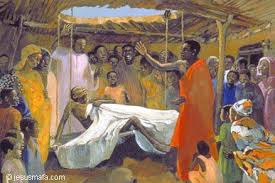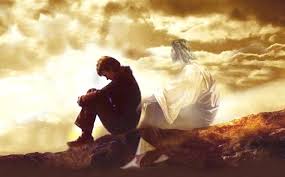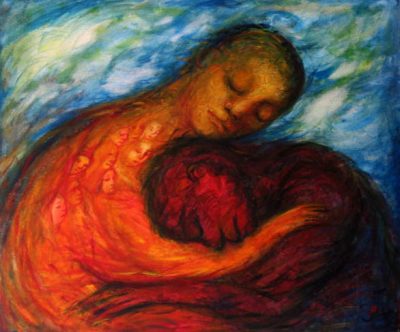
Seventh Sunday in Ordinary Time Year B
Gospel reading: Mark 2:1-12
vs.1 When Jesus returned to Capernaum some time later, word went round that he was back;
vs.2 and so many people collected that there was no room left, even in front of the door. He was preaching the word to them
vs.3 when some people came bringing him a paralytic carried by four men,
vs.4 but as the crowd made it impossible to get the man to him, they stripped the roof over the place where Jesus was; and when they had made an opening, they lowered the stretcher on which the paralytic lay.
vs.5 Seeing their faith, Jesus said to the paralytic, “My child, your sins are forgiven.”
vs.6 Now some scribes were sitting there, and they thought to themselves,
vs.7 “How can this man talk like this? He is blaspheming. Who can forgive sins but God?”
vs.8 Jesus, inwardly aware that this was what they were thinking, said to them,
“Why do you have these thoughts in your hearts?
vs.9 Which of these is easier: to say to the paralytic, ‘Your sins are forgiven’ or to say, ‘Get up, pick up your stretcher and walk’?
vs.10 But to prove to you that the Son of Man has authority on earth to forgive sins,” –
vs.11he said to the paralytic – “I order you: get up, pick up your stretcher, and go off home.”
vs.12 And the man got up, picked up his stretcher at once and walked out in front of everyone, so that they were all astounded and praised God saying,
“We have never seen anything like this.”
*******************************************************************
We have two commentators available from whom you may wish to choose. Click on the name of the commentator required.
Michel DeVerteuil: a Holy Ghost Priest, and Specialist in Lectio Divina
Sean Goan: Studied scripture in Rome, Jerusalem and Chicago and teaches
at Blackrock College and part time at Milltown Institute
****************************************
Michel DeVerteuil
Lectio Divina with the Sunday Gospels
www.columba.ie
General Comments
Today’s passage is complex. Scholars have analysed it and shown that the passage is an interweaving of several stories, each with its own theme.
We can see three themes running through it:
a) the healing of the paralytic;
b) the forgiveness of sins;
c) the controversy with the scribes.
We can remain with one theme, or meditate on them as a unit, each theme flowing into the next.
The following division can be helpful in identifying the different strands in the passage:
a) verses 1-2 : the setting;
b) verses 3-4 : the paralytic makes his appearance;
c) verses 5-11 : dialogue:
d) verse 12 : the result.
The healing of the paralytic is a tremendous story with many lessons about how we are called to respond to the vagaries of our daily lives.
As in all the healing stories, we are free to focus either on the one who was healed, or on Jesus the healer.
If we are identifying with the paralytic, we make the journey with him in three stages, at each stage allowing the imaginative language to bring back memories which touch us. We can also identify with Jesus, the healer.
We are “carried on a stretcher by friends“, people of faith who “lower us from the roof“ to the presence of the healer. In last week’s story, the leper symbolised the experience of feeling unclean, unworthy to associate with the community we belong to. The paralysed man symbolises a different experience, when we feel helpless, we cannot “walk on our own”, take charge of our lives, make decisions, take initiatives, respond creatively to the challenges of life.
As a result of Jesus’ ministry, we are able “to stand up in front of the crowd” and to “go off home.” We celebrate the wonderful moment when we are healed from our paralysis – we “get up, pick up our stretcher” and “walk out in front of everyone”, so that “they are all astounded.”
We start from the experience of “paralysis” resulting from failure of one kind or another. Jesus healed a variety of ailments and it is good to make a distinction between the different ailments, allowing each one to symbolize a particular form of human suffering. We think of various ailments such as suffering from some form of sickness; feeling that we don’t have enough confidence to speak out for ourselves; feeling that we have failed in some aspect of our lives and therefore cannot affirm our independence.
We celebrate parents, teachers, counsellors, friends, whose tender compassion (“my child”) has empowered us when we felt paralysed.
The issue of Jesus and the scribes is in two parts:
(a) verses 6 and 7
(b) Jesus responds, verses 8 to 10.
Here again the story is told in stages. Jesus discerns the root cause of the paralysis – sins have not been forgiven. How often our paralysis is due to the fact that we haven’t experienced ourselves as forgiven – by ourselves, by those we love – those our modern language calls “significant others“, or then by God.  Few people have the wisdom to discern the root problem which keeps us paralysed. Once we hear those wonderful healing words, “My child, your sins are forgiven,” “at once” we are healed of the paralysis. We can identify with the amazement of the crowd as they see the healing power of forgiveness.
Few people have the wisdom to discern the root problem which keeps us paralysed. Once we hear those wonderful healing words, “My child, your sins are forgiven,” “at once” we are healed of the paralysis. We can identify with the amazement of the crowd as they see the healing power of forgiveness.
As often happens in the gospels, the teaching is in the form of a controversy. Jesus and the scribes represent two possible ways of dealing with the situation. We have followed both ways at different times; often they are two tendencies struggling for power within ourselves.
We can interpret “Son of Man” in two senses.
a) He is one person, the Messiah, Jesus, and by extension his Body, the Church. The passage then celebrates the Church’s ministry of forgiving sins, through the sacraments, counselling, spiritual direction, or (as has happened from time to time in recent years) by being an agent of reconciliation between warring factions in a community. Jesus asserts his power against the scribes who are sceptical about it.
b) It has a collective sense – weak human beings. The scribes then are ourselves when we doubt the power of individuals or communities to break down barriers and forgive. The response of Jesus is our personal response – we know we can do it.
Verse 10 is difficult to interpret. It is first of all a sign that the different themes mentioned above have not been neatly meshed. It is not necessary to know the exact meaning of the verse; getting the general movement of thought is sufficient.
Prayer Reflection
“Always try to do too much, dispense with safety nets, aim for the stars.”
… Salman Rushdie
Lord, we remember a time when we felt paralysed
and had to be carried on a stretcher:
– we had failed in an enterprise we had set our hearts on;
– we were let down by someone we trusted;
– we had committed a sin we never thought we would fall into;
– our prayer life had become dry.
We thank you for loyal friends
who, like the four men who stripped the roof over the place where Jesus was,
went to considerable trouble to bring us before the one who could heal us.
They made an appointment for us, insisted on getting us in ahead of others,
fitted us into a crowded schedule.
We thank you for the Jesus they brought us to,
who understood that we had allowed our sins to paralyse us
– the foolish decisions we had taken;
– our arrogance;
– the secret addictions we had not attended to.
We heard ourselves being called “beloved child“,
we were told that our sins were forgiven,
that we must pull ourselves together and make a new start.
The words had an instant effect –
we got up, picked up our stretcher and walked out in front of everyone,
so that they were all astounded
and praised you, saying “We have never seen anything like this”.
We thank you for the ministry of forgiveness exercised by the ministers of
your Church,
* through the sacrament of reconciliation,
* counselling sessions in presbyteries;
– mediation in social conflicts.
We celebrate the countless paralytics – individuals, couples, communities –
who were brought by friends to hear the healing words,
“My child, your sins are forgiven,”
and then picked themselves up and walked out in front of everyone.
They thought to themselves that no one on earth had the authority
to tell them that their sins were forgiven;
now they are astounded and praise you, saying “We have never seen anything like this.”
“Able to approach the future as a friend without a wardrobe of excuses.” ..W.H. Auden
Lord, we thank you for the times when you send people to confound the scepticism
which prevents us from seeing the potential within ourselves and our communities.
So often, like the scribes in the time of Jesus, we remain locked in the past,
thinking that only some miraculous intervention can raise us up from our paralysis,
and that we would be blaspheming if we were to say that our sins can be forgiven.
Then you send us someone like Jesus who is inwardly aware of how we are thinking
and has the moral authority to order us to “get up, pick up your stretcher and go off home.”
“Hope for a great sea-change On the far side of revenge…Seamus Heaney
Lord, we pray today for societies that are paralysed
because warring factions cannot forgive the sins of the past:
– Northern Ireland
– Arabs and Israelis
– Tamils and Sinhalese in Sri Lanka.
There are sceptics sitting among them, like the scribes in the time of Jesus,
doubting in their hearts that you have given your human Sons and Daughters
the authority on earth to forgive sins.
Send them leaders like Jesus who are inwardly aware that many have these thoughts
in their hearts,
but see the faith of those who are looking for a new future
and pronounce the words that all the ancient sins have been forgiven,
command the former enemies to throw away the symbols of their past paralysis,
and go off to make their country a home for all,
so that all will be astounded and say,
“We never thought we would see anything like this.”
********************************************************
Sean Goan
Let the Reader Understand
www.columba.ie
Comments on Gospel: Mark 2:1-12
In chapter one of Mark’s gospel it was very evident how Jesus’ proclamation of the kingdom was accomplished in both word and deed. He taught in the synagogues and he healed and performed exorcisms wherever he found people suffering. By his preaching and his actions Jesus was pointing to the presence of God in their midst and in today’s incident he does so again, this time through the gift of forgiveness. The scene invites reflection as Jesus’ action not only frees this man from the paralysis of sin but also highlights the obstacles Jesus has to face from those who seek the limit the ways in which God’s mercy may be experienced. It is interesting to note that the spark for Jesus’ action is the faith of those who go to such trouble to bring their friend to him and that the response of the crowds is once again wonder and praise.
Reflection
A cynical commentator on religion once paraphrased the scriptures with the words: ‘In the beginning was the Word and the word was No!’ This is profoundly sad because, as we can see from these readings, God’s word to us yesterday, today and forever is always Yes. He says yes to life, to love and to everything that is good for humanity, for God only wants to show us how to avoid the path to self-destruction and to how find our true home in him. The good news of the kingdom is not a message about something that happened in the past in the Holy Land, it is eternally in the present for Jesus loves us anew every day.
***************************